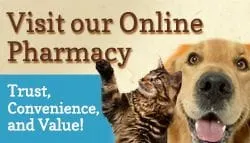Foods & Beverages
- Alcoholic Beverages - can cause lack of coordination, low body temperature, and respiratory depression
 Chocolate
- (Baking is more toxic than dark which is more toxic than milk
chocolate)- contains methylxanthines: Less than 2 oz milk choc/kg body
weight can cause clinical signs (http://www.vin.com/mainpub/xmas/default.asp) which include excitement/hyperactivity progressing to delirium, seizures, and convulsions.
Chocolate
- (Baking is more toxic than dark which is more toxic than milk
chocolate)- contains methylxanthines: Less than 2 oz milk choc/kg body
weight can cause clinical signs (http://www.vin.com/mainpub/xmas/default.asp) which include excitement/hyperactivity progressing to delirium, seizures, and convulsions. - Fatty Foods - high fat foods can cause pancreatitis in pets which leads to vomiting, diarrhea and abdominal pain.
 Christmas Tree Water
- may contain extenders and fertilizer which can cause oral and stomach
irritation. The stagnant water can also contain bacteria which may
cause vomiting, nausea, and diarrhea.
Christmas Tree Water
- may contain extenders and fertilizer which can cause oral and stomach
irritation. The stagnant water can also contain bacteria which may
cause vomiting, nausea, and diarrhea. - Onions, Onion Powder, and Garlic - all can cause vomiting, liver damage, and anemia (low red blood cells)
- Moldy and Spoiled Foods - can contain mycotoxins and bacteria.
Plants
- Lilies - most Lilly types cause renal failure in cats when ingested.
- Mistletoe - mostly causes GI upsets (vomiting and diarrhea) but large quantities can cause cardiovascular problems.
- Holly - ingestion leads to vomiting, nausea, diarrhea, and lethargy
- Poinsettias - toxic ingestion may lead to irritation of the mouth, esophagus, and stomach, and cause mild vomiting and diarrhea; potential neurological effects.
Other Considerations
- Ribbons or Tinsels - may look like a fun toy to
 your dog or cat but can cause intestinal obstruction.
your dog or cat but can cause intestinal obstruction. - Glass Ornaments - can cut tissues of the gastrointestinal tract if ingested (Interestingly, some snow globes contain ethylene glycol
 (antifreeze) and four teaspoons of antifreeze is dangerous to a 10 pound dog).
(antifreeze) and four teaspoons of antifreeze is dangerous to a 10 pound dog). - Liquid Potpourris - These can be very irritating with gastrointestinal exposure and also exposure to the skin or eyes.
- Antifreeze - small amounts can be lethal, three phases: acute is within 12 hours and includes ataxia, depression and labored breathing, intermediate is from 12-24 hours with nondescript signs that appear patient is improving, and finally end stage from 24-72 hours with severe depression, anorexia, and vomiting.
- Batteries - corrosive acid can cause ulceration throughout the gastrointestinal tract.
- Snow & Ice Melters - depends on product but signs include excessive salivation, depression, vomiting, and electrolyte abnormalities.
- Electric Cords - the electricity will cause an electric shock and likely electrocute.
Please remember to keep all prescription and over-the-counter medications safely away from pets. Many human drugs are potentially lethal, even in small doses.
- One (1) regular-strength ibuprofen tablet (200mg) can cause stomach ulcers in a 10-pound dog and less than one (<1) regular strength acetaminophen tablet (325mg) can be dangerous to a cat weighing 7lbs (http://www.vin.com/mainpub/xmas/default.asp)
If any exposure or potential exposures occur, the ASPCA poison control hotline may be reached 24 hours a day at 1-888-4-ANI-HELP (1-888-426-4435) or through the webpage http://www.aspcapro.org/poison.
From all of us here at Seneca Animal Hospital,





